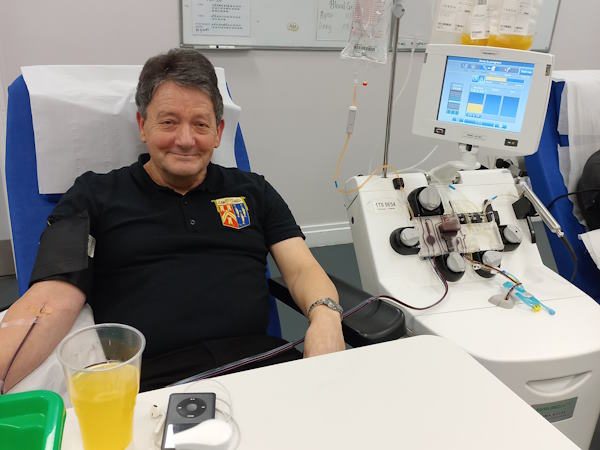
Changing More Lives More Often
Worshipful Brother Alan Dunnicliff of Abbey Lodge is proud of his Blood Donation record having donated 88 times to date. He’s determined to continue for as long as is possible. Alan realises that donating blood can and does change lives. Recently he was asked to consider donating platelets which is undertaken in Manchester. Typical of Alan he readily agreed and now has been to a couple of appointments.
Why the need for platelets?
Platelets are tiny fragments of cells made in your bone marrow. So tiny, in fact, that you’ll find about 250 million in every millilitre of blood — it’s hard to imagine!
They last only 7 days, that’s 168 hours. It’s barely any time at all. But that’s how long platelets last from the moment they’re donated so the NHS Blood Donation service has to move fast.
Platelets clump together to stop bleeding, seal wounds and help ‘plug’ leaks in damaged blood vessels. Ever had a scab? That’s right — those are thanks to platelets. People with leukaemia or going through treatments like chemotherapy can have their platelet counts become so low that they have spontaneous bleeding.
Even a small amount of bleeding is dangerous, but it’s especially so if it happens in the brain. Enter platelets: they can stop that from happening by clotting the bleed. Platelets can also stop bleeding during surgery or after major trauma such as a workplace accident.
Only males can give platelets.
The male-only requirement may seem strange, but it’s because of a serious condition called transfusion-related acute lung injury (TRALI). It’s a rare, but sometimes fatal, condition that can lead to breathing difficulties and low blood oxygen in patients after a transfusion. It’s thought to be caused by antibodies (proteins produced by the immune system which attack foreign substances) found more commonly in the blood of women.
Donating platelets is a lot like donating blood, and even more rewarding. The process is called ‘apheresis’ which is just another word for how the platelets (and plasma, too) are collected.
While Alan is resting in a comfortable chair, a special machine draws blood from his arm. The machine separates the blood out to collect the platelets along with some plasma. Alan’s red cells and most of the plasma are then returned to you.
Donating this way means Alan will give anywhere from 4 to 12 times as many platelets as he would in a normal blood donation! Alan could donate platelets as often as every 2 weeks but is just settling nicely into a once a month routine.
Donating itself takes about an hour giving Alan time to read, catch up on his favourite TV shows or just enjoy some uninterrupted down time. The whole appointment takes around 2 hours.
With his platelet and soon-to-be plasma donation Alan is now changing more lives more often.
Well done, Alan.
More information on platelet donation available here NHS Blood and Transplants



